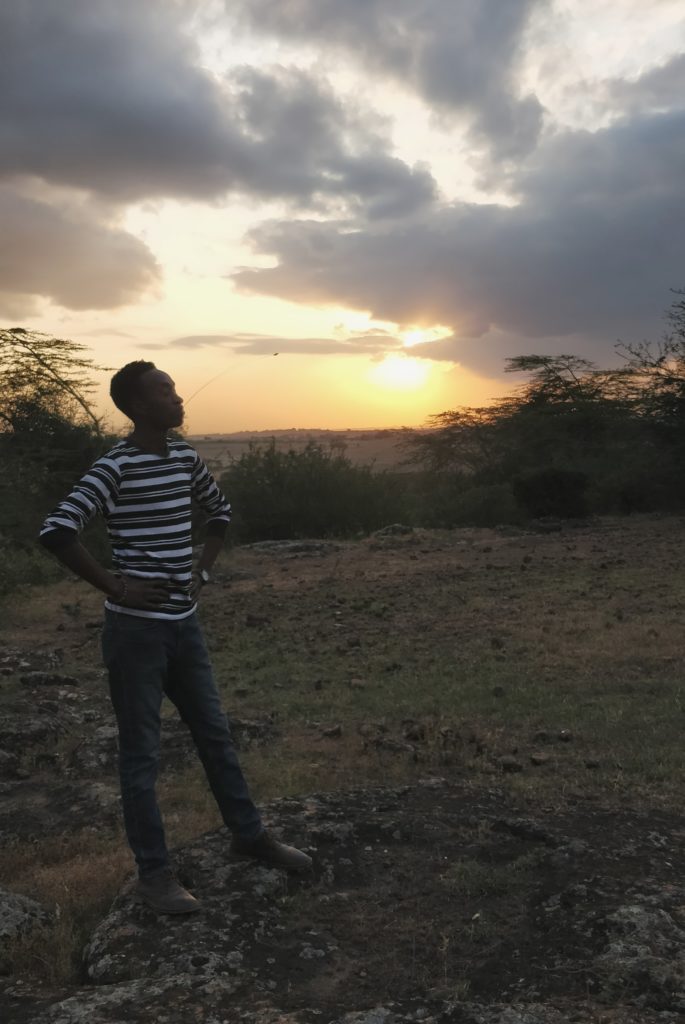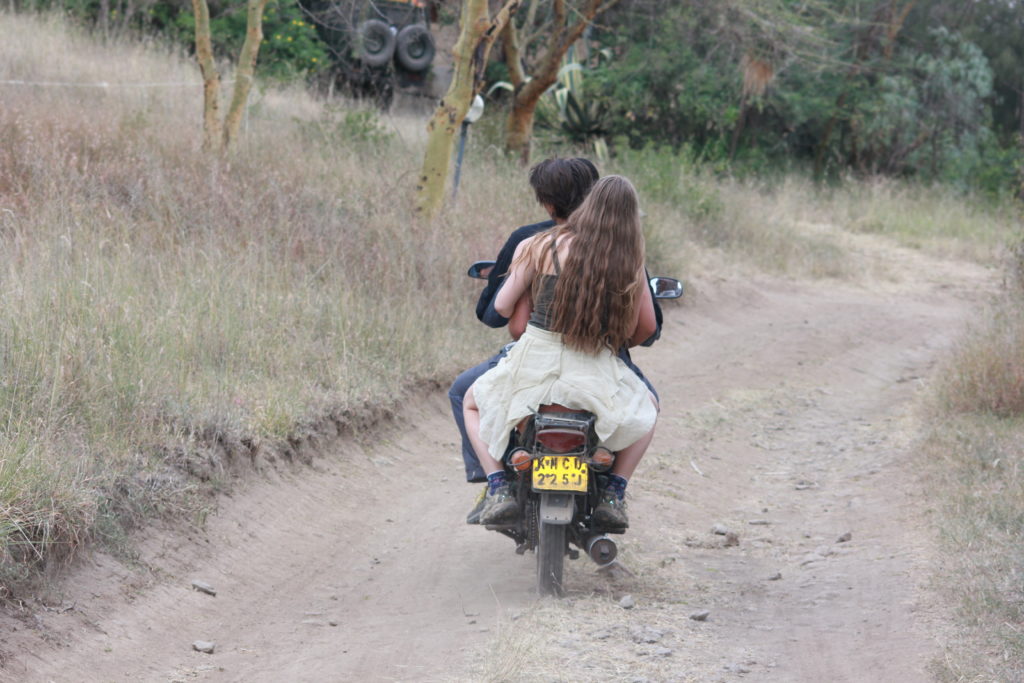We spent the last few days of our second week conducting more interviews, monitoring the camera traps, and preparing for the next leg of our trip into Kenya’s Rift Valley region. Mandela had left earlier in the week to return to his job at a conservancy in the Maasai Mara, where we would hopefully see him again once we arrived there. In his absence we were given a new guardian by the name of Bryan, who had apparently been roped in via Mandela’s cousin Jackson. He was strikingly tall and perennially well-dressed, with an easy-going manner and offbeat sense of humour that made us all take an instant liking to him.
As the week went on, we got to know Bryan better. He was 24 years old and fresh out of university, where he had studied environmental planning and management, but his graduation had been delayed by a year due to an administrative error (by the time we met him, this date was a mere week away, which filled him with considerable excitement). Unlike some of the wild-living, nature-loving conservationists we had met, Bryan was a city boy through and through, always dressed in his uniform of crisp shirt, skinny jeans and Oxford shoes. He was constantly making and receiving phone calls at all hours of the day, leaving us no choice but to assume that he was either a shady government agent or the most popular guy in Kenya. One consequence of Bryan’s urban sensibilities was that he only had experience driving automatic cars, so when it came to the manual controls of the unwieldy beast that was Jeeves, he was a little shaky. Once we got over the initial screaming terror of it all, we discovered that his jolty, juddering driving provided an excellent source of entertainment through the long hours out in the bush.

Jeeves was in a bad way after our little hiccup at Michael Mbithi’s ranch, so we took our trusty steed to Kitengela for some refurbishment. Our most pressing mission was to get the front bar welded back on, because it also had the car’s registration plate on it and we had a sneaking suspicion that it was somewhat illegal to be driving around without one. We found a workshop on a back street in Kitengela, with a sign promising that its engineers could weld eggs back together. Though doubtful of the veracity of this claim, we felt safe in the assumption that they should at least be able to handle cars. While Bryan sorted out the logistics, we scrambled out of the jeep to avoid choking on the fumes that were billowing from a plastic fire a short distance away.
Stumbling out in a coughing, light-headed daze, we scurried to the other side of the road while one of the engineers pulled out his blowtorch and set to work right there on the street. Solomon slipped away muttering something about food, and returned a few minutes later with a corn on the cob, dusted with chilli powder and roasted to a perfect golden crisp. He passed it around the group in a manner that felt almost ceremonial, as we took it in turns to scrape off a row of kernels in hungry, appreciative silence. We stood this way by the road for some time, eating our corn on the cob, minding our business. A truck drove past with a man hanging off the back, nonchalantly holding on with one hand.
“That’s not safe,” noted Solomon in his soft monotone.

With our ride fully operational once again, it was almost time to depart for the Maasai Mara. Before we left, we had the chance to meet something of a local hero. His name was Richard, but everyone referred to him as Lion Boy. This was the celebrated inventor of the lion light, a piece of technology which has already improved the lives of numerous Kenyan cattle herders and influenced similar designs throughout Africa and the rest of the world. Remarkably, he designed the first lion light when he was only 11 years old; as I recall, when I was that age I had only just graduated from Lego.
We were immediately struck when we met him by how cool he was, for want of a less prosaic word; sitting in front of us was a fashionably dressed 19-year-old student, one year into a university course on conservation biology, living from student discounts, who just happened to be the youngest patent holder in Kenya. He was thoughtful and measured in his responses to our questions, revealing a creative mind that was brimming with new ideas. Though he is still refining and improving the lion lights with new features like motion activation, his sights are set higher, and he hopes to transfer to an American university where he will have more opportunities for entrepreneurship and innovation.
When we asked him to tell us more about his new projects, he was understandably cagey – though he secured a patent for lion lights when he was only 15 years old, this wasn’t soon enough, and a number of knock-off imitations exist which damage the credibility of his brand and lead people to lose trust in the concept if they buy a faulty version. It was never about the money for Richard, in any event – the lights are not sold for profit, and he has made their designs available online so if people want to build or fix their own at a reduced cost then they are free to do so. His motivation always came from a love of tinkering (he shared a story in which he tore apart his mother’s new radio as a child, and was only spared her ire by his ability to fix it just as quickly), and a deep respect for the wildlife that he has grown up with. As far as Richard is concerned, there is no need for conflict with lions and other wild animals so long as humans can peacefully coexist with them, and lion lights represent an innovative step in that direction.
He was less optimistic than I had expected about the future of conservation, citing corruption and ineffective governance in Kenya as a major barrier. His own project had received no government funding, relying instead on NGOs to make up the shortfall. He was particularly angry about the railway line which had recently been constructed straight through the middle of Nairobi National Park, despite widespread opposition from conservationists and several unresolved legal challenges. Lion Boy’s friend and sometime assistant, a wide-eyed joker named Harrison, began trying to convince us to help him with his guerrilla mission to tear down the railway by cover of darkness. His tone was humorous, but his frustration was real.
We thanked them for taking the time to speak to us, and came away feeling more than a little humbled. If Richard has already achieved this by the age of 19, who knows what he will do next? I only hope that his brilliance is not lost in the system, and that his big ideas are paired with the kind of money that can make them a reality.
With slightly heavy hearts, we packed our bags the following day and said our farewells to the camp that had become a home away from home for the last two weeks. What would we do without Chris’s cooking and Solomon’s deadpan comments? Who would build campfires for us, if not Jacob and Vincent? As we rolled out of Kiboko Camp and waved goodbye to the grinning gatekeeper, we comforted ourselves with the thought that we would return for our final week, with plenty of stories from the adventures soon to come.
